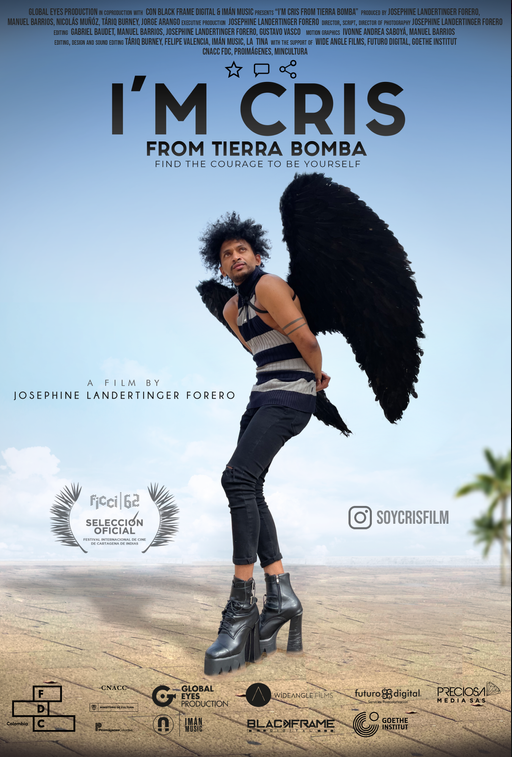One of the queer films available July 6-9, as part of the Philadelphia Latino Film Festival’s virtual programming blocks, is “Soy Cris de Tierra Bomba/I’m Cris from Tierra Bomba,” an immersive documentary portrait of Cristian Aarón Freite, a young Afro-Colombian man. While Freite is part of the LGBTQ+ community, he explains in the end of the film, “I put labels aside,” preferring not to be identified as bisexual or homosexual.
With his wild mane of kinky black hair and bright smile, the charming Freite is an ingratiating subject for filmmaker Josephine Landertinger Forero. She traces Freite’s life over a seven-year period, starting in 2015. He lives in Tierra Bomba, an island not far from Cartagena in Colombia. Not much is revealed about Freite’s backstory. There is a brief discussion of how he was bullied for years in school for being different. He explains how older kids nearly raped him, and it is implied this happened because of his sexuality. There is additional talk of sexual abuse in the film.
Freite is currently a student in biology, but he wants to be an actor. “I want to say goodbye to the daily difficulties of society through art,” he explains when asked why he wants to pursue a career that has limited options in Colombia. Freite also says his goal in life is to “serve” (help) people — and he does briefly get political, posting about the government not caring about the island of Tierra Bomba on his social media channel.
Forero follows Freite into the science lab, hanging out with friends, and going to class, as well as doing things around his house, from cooking to doing yard work. He also posts about being a model and helping young women in Tierra Bomba with photo shoots.
These scenes establish the rhythm of Freite’s life, but he is restless. “I’m Cris from Tierra Bomba,” shows how its subject does not follow through on many of the projects he takes on. He changed his coursework several times before landing on biology and is now giving that up to study acting. He gets a scholarship at the performing arts school, but after a few classes, stops going (much to Forero’s exasperation), which prompts a meeting with his teacher to understand what he needs to do to stay in school.
Freite may have decided that he can perform without school, and posts about being on “Narcos 3” (though nothing further is mentioned) and about a surgery he has. He talks about going to Bogotá since he cannot find much work in Cartagena. Going on many casting calls, Freite has few successful meetings. He continues to model and do protocol work (e.g, daylong promotional assignments), but his career never quite takes off. He bemoans the fact that Black actors are stigmatized and often relegated to stereotypical roles such as criminals.
Freite wants more than that, and he may get the opportunity in Mexico, where he goes in 2019. Forero does not have much contact with him around or after this time, despite her few text messages inquiring about his well-being. Freite is soon globe-hopping, going to Italy, Germany, and Austria, where he posts and chats briefly with Forero. What exactly he is doing in Europe is never clearly explained. But what is eventually revealed is that Freite met a man who is sponsoring him.
In a confessional moment, Freite talks honestly about his insecurities and his anxieties about being attracted to men, something he has known about himself since he was ten years old. “I’m Cris from Tierra Bomba” is best in this sequence, with Freite dropping the illusions he has had all along. It takes awhile to get to this breakthrough of Freite developing his self-worth, but it happens at the right moment for him. Everyone — the film says — is on their own journey. And watching Freite feel empowered as he accepts and embraces his identity, getting some angel wings, is gratifying.
However, Forero’s interest in making a documentary about Freite and his desire to be an actor never seems clear. The film meanders — much like its subject does — before reaching its point, which can be frustrating. Individual scenes of Freite finding joy in cooking or taking photos for his social media are engaging, but they also feel rather superficial.
That may be the point.
If “I’m Cris from Tierra Bomba” is meant to address the difficulties of queer youth coming out in Latino/Colombian society, that topic is buried. And it is also curious why the film does not delve deeper into Freite’s life once he reveals his sexuality. It feels strangely underdeveloped, and Freite is such a charismatic guy that one wants to know more about him and his life. These drawbacks do not spoil the film, which provides an interesting glimpse into a life most viewers would otherwise not get to see, but Forero does raise more questions than her film answers.
“I’m Cris from Tierra Bomba,” is available online July 6-9 from the Philadelphia Latino Film Festival. For tickets and more information, click here.

